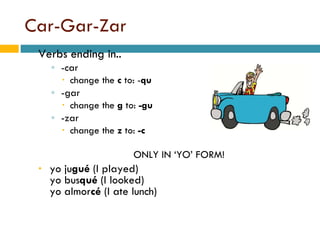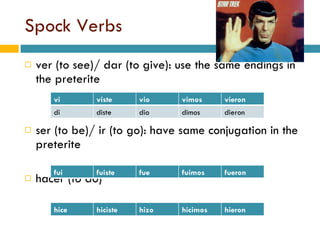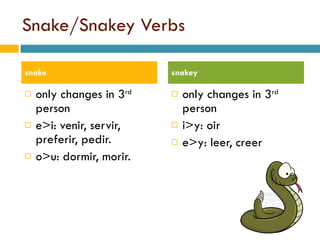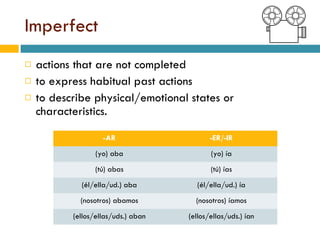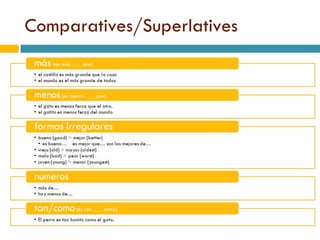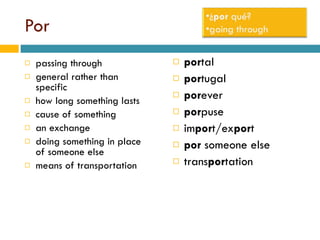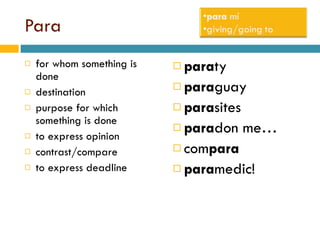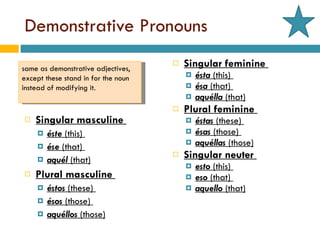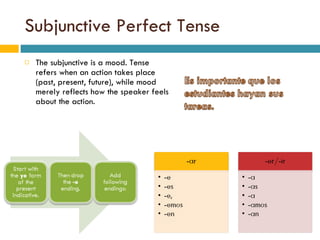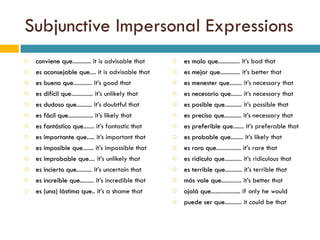FINAL grammar book
- 1. GRAMMATICAL CONCEPTS BOOK Elisa Jones Periodo 3 Honors Spanish 3
- 2. Table of Contents Preterite Preterite Trigger Words Car-Gar-Zar Spock Verbs Cucaracha Verbs Snake/Snakey Verbs Imperfect Imperfect Trigger Words Imperfect Irregular Preterite vs. Imperfect Ser vs. Estar Verbs Like Gustar Comparatives/ Superlatives Connecting Words Future Future Trigger Future Irregular Por Para Demonstrative adjectives Demonstrative pronouns
- 3. Preterite actions that are completed to express the beginning or end of a past action to narrate a series of past actions/events -AR -ER/IR yo -é -í tú -aste -iste él/ella/ud. -ó -ió nosotros -amos -imos ellos/ellas/uds. -aron -ieron
- 4. Preterite Trigger Words el dia anterior ayer la semana pasada en fin de semana pasada el mes pasado el otro dia anoche the day before yesterday last week last weekend last month the other day last night En Espa ñol En Inglés
- 5. Car-Gar-Zar Verbs ending in.. -car change the c to: - qu -gar change the g to: -gu -zar change the z to: -c ONLY IN ‘YO’ FORM! yo ju gué (I played) yo bus qué (I looked) yo almor cé (I ate lunch)
- 6. Spock Verbs ver (to see)/ dar (to give): use the same endings in the preterite ser (to be)/ ir (to go): have same conjugation in the preterite hacer (to do) fui fuiste fue fuimos fueron vi viste vio vimos vieron di diste dio dimos dieron hice hiciste hizo hicimos hieron
- 7. Cucaracha Verbs -e -iste -o -imos -ieron all share same endings! Verb 1st Person Andar Anduve Conducir* Conduje Decir* Dije Estar Estuve Verb 1st Person Hacer Hice Poner Puse Poder Pude Querer Quise Verb 1st Person Saber Supe Tener Tuve Traer* Traje Venir Vine
- 8. Snake/Snakey Verbs only changes in 3 rd person e>i: venir, servir, preferir, pedir. o>u: dormir, morir. only changes in 3 rd person i>y: oir e>y: leer, creer snake snakey
- 9. Imperfect actions that are not completed to express habitual past actions to describe physical/emotional states or characteristics. -AR -ER/-IR (yo) aba (yo) ía (t ú ) abas (t ú ) ías (él/ella/ud.) aba (él/ella/ud.) ía (nosotros) abamos (nosotros) íamos (ellos/ellas/uds.) aban (ellos/ellas/uds.) ían
- 10. Imperfect Trigger Words todos los dias siempre nunca a veces a menudo casi siempre todo el tiempo every day always never sometimes often almost always all the time En español En Inglés
- 11. Imperfect Irregular Verbs IR (to go) SER (to be) VER (to see) yo iba era veía tú ibas eras veías él/ella/ud. iba era veía nosotros íbamos éramos veíamos ellos/ellas/uds. iban eran veían
- 12. Preterite vs. Imperfect Preterite: perfect action in the past Imperfect: unperfected action in the past
- 13. Ser vs. Estar d escription o rigin c haracteristics t ime o ccupation r elationships p ossession e vent d ate h ealth e motions l ocations p resent condition i n g ser (to be) estar (to be) present participles -ar: -ando -er/ir: -iendo or -yendo
- 14. Verbs Like Gustar hacer faltar soprender disgustar doler apetecer preocupar interesar encantar fascinar example of gustar: “Me gusta mi perro.” the subject pronoun is placed in front of the verb, which is subjugated according to the direct object (singular or plural). example: “Te amo” literally translated means “you I love.” me te le nos les
- 16. Connecting Words aunque tambi é n mientras pero por lo tanto a pesar de sin embargo/no obstante even though also while but therefore in spite of nevertheless en espa ñol en inglés
- 17. Future Tense I, you, he/she, we, they WILL. same endings for -ar, -er, & -ir yo + infinitive + é tú + infinitive + ás él/ella/ud. + infinitive + á nosotros + infinitive + emos ellos/ellas/uds. + infinitive + án comer yo comeré tú comerás él comerá nos comeremos ellos comerán
- 19. Future Irregular Tense decir dir hacer har poder podr poner pondr querer querr saber sabr salir saldr tener tendr valer valdr venir vendr all still keep the same future tense endings!
- 20. Por passing through general rather than specific how long something lasts cause of something an exchange doing something in place of someone else means of transportation por tal por tugal por ever por puse im por t/ex por t por someone else trans por tation
- 21. Para for whom something is done destination purpose for which something is done to express opinion contrast/compare to express deadline para ty para guay para sites para don me… com para para medic!
- 22. Demonstrative Adjectives always are in the front of the verb always agree in gender & number
- 23. Demonstrative Pronouns Singular masculine éste (this) ése (that) aquél (that) Plural masculine éstos (these) ésos (those) aquéllos (those) Singular feminine ésta (this) ésa (that) aquélla (that) Plural feminine éstas (these) ésas (those) aquéllas (those) Singular neuter esto (this) eso (that) aquello (that) same as demonstrative adjectives, except these stand in for the noun instead of modifying it.
- 24. Elisa Jones 3 rd Period Grammar Book: 2 nd Semester
- 25. Conditional y Irregulares What would happen under certain conditions.
- 26. Present Perfect Tense using the word ‘have’ or ‘has’ with a past participle.
- 28. Past Perfect Tense Using the word ‘had’ with a past participle.
- 29. Subjunctive Perfect Tense The subjunctive is a mood. Tense refers when an action takes place (past, present, future), while mood merely reflects how the speaker feels about the action.
- 30. Tanto y Tan Nouns & Adverbs Tanto (a/as/os) + (noun/adv) + como Sancho tiene tanto comida como Raquel. Adjectives & Adverbs Tan + (Adj/adv) + como Ava es tan alta como Juan. Tanto Tan
- 31. Impersonal ‘se’ To form the impersonal se, verbs are always 3rd person singular and are commonly followed by a direct object. Impersonal ‘se’ is used when the verb is not referring to anyone in particular/everyone. Se habla español aquí.
- 32. Saber vs. Conocer To express knowledge or ignorance of a fact or information about something Juan sabe donde está María. To say that one is or is not acquainted with a person, a place, or an object Alberto y Alfredo conocen Madrid. Saber Conocer
- 34. Formal Commands
- 35. Nosotros Commands + -mono verbs
- 36. Subjunctive Used for attitudes, uncertainity, hypothetical, emotion, doubt, disbelief, denial, indefiniteness and non-existence. Put in ‘yo’ form, then subjunctive ending Dudo que usted vaya al Hawaii en mayo. (use of doubt)
- 37. Subjunctive Irregular -car, -gar, -zar (only in TVDISHES
- 38. Subjunctive Trigger Phrases to doubt Dudar que… to prefer Preferir que… unless A menos que… It’s important Es importante que… to need Necesitar que… to desire Desear que… so that Para que… It’s difficult Es difícil que… to hope Esperar que… to insist on Insistir en que… I or we hope Ojalá (que)… It’s necessary Es necesario que… to ask Pedir que… to like Gustar que… Without Sin que… It’s possible Es posible que… to think No pensar que… to tell Decir que… Before Antes que… Maybe Tal vez… to want Querer que… not to believe No creer que… Provided that Con tal de que…
- 39. Subjunctive Impersonal Expressions conviene que ............ it is advisable that es aconsejable que .... it is advisable that es bueno que ............ it’s good that es difícil que .............. it’s unlikely that es dudoso que .......... it’s doubtful that es fácil que ................ it’s likely that es fantástico que ....... it’s fantastic that es importante que ..... it’s important that es imposible que ....... it’s impossible that es improbable que .... it’s unlikely that es incierto que .......... it’s uncertain that es increíble que ......... it’s incredible that es (una) lástima que .. it’s a shame that es malo que .............. it’s bad that es mejor que ............. it’s better that es menester que ........ it’s necessary that es necesario que ....... it’s necessary that es posible que ........... it’s possible that es preciso que ........... it’s necessary that es preferible que ....... it’s preferable that es probable que ........ it’s likely that es raro que ................ it’s rare that es ridículo que ........... it’s ridiculous that es terrible que ........... it’s terrible that más vale que ............. it’s better that ojalá que ................... if only he would puede ser que ........... it could be that
- 40. Expressions of emotion & conjunctions of time sentir que alegarse que temer que esparar que así que cuando despues de que en cuanto hasta que luego que tan pronto como Emotion Time
Editor's Notes
- Después de que




